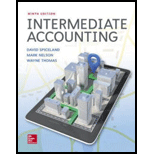
Classifying accounting changes and errors
• LO20–1 through LO20–6
Type of Adjustment
A. Change in accounting principle (reported retrospectively)
B. Change in accounting principle (exception reported prospectively)
C. Change in estimate
D. Change in estimate resulting from a change in principle
E. Change in reporting entity
F. Correction of an error
_____ 1. Change from expensing extraordinary repairs to capitalizing the expenditures
_____ 2. Change in the residual value of machinery
_____ 3. Change from FIFO inventory costing to LIFO inventory costing
_____ 4. Change in the percentage used to determine warranty expense
_____ 5. Change from LIFO inventory costing to FIFO inventory costing
_____ 6. Change from reporting an investment by the equity method due to a reduction in the percentage of shares owned
_____ 7. Change in the composition of a group of firms reporting on a consolidated basis
_____ 8. Change from sum-of-the-years’-digits
_____ 9. Change from FIFO inventory costing to average inventory costing
_____ 10. Change in actuarial assumptions for a defined benefit pension plan
Want to see the full answer?
Check out a sample textbook solution
Chapter 20 Solutions
Intermediate Accounting
Additional Business Textbook Solutions
Intermediate Accounting (2nd Edition)
Horngren's Accounting (12th Edition)
Marketing: An Introduction (13th Edition)
Horngren's Cost Accounting: A Managerial Emphasis (16th Edition)
Essentials of MIS (13th Edition)
Operations Management: Processes and Supply Chains (12th Edition) (What's New in Operations Management)
- Which of the following accounts normally has a credit balance?A. Accounts ReceivableB. Sales RevenueC. EquipmentD. Rent Expense need helparrow_forwardWhich of the following accounts normally has a credit balance?A. Accounts ReceivableB. Sales RevenueC. EquipmentD. Rent Expensearrow_forwarddo not use aiWhich of the following is a nominal account?A. CashB. Accounts PayableC. Sales RevenueD. Equipmentarrow_forward
- Which of the following is a nominal account?A. CashB. Accounts PayableC. Sales RevenueD. Equipment need anarrow_forwardWhich of the following is a nominal account?A. CashB. Accounts PayableC. Sales RevenueD. Equipmentneed helparrow_forwardWhich of the following is a nominal account?A. CashB. Accounts PayableC. Sales RevenueD. Equipmentarrow_forward
- Please help me solve this general accounting question using the right accounting principles.arrow_forwardI need assistance with this general accounting question using appropriate principles.arrow_forwardI need assistance with this general accounting question using appropriate principles.arrow_forward
- I am looking for help with this general accounting question using proper accounting standards.arrow_forwardI am trying to find the accurate solution to this general accounting problem with the correct explanation.arrow_forwardPlease provide the answer to this general accounting question with proper steps.arrow_forward
- Principles of Accounting Volume 1AccountingISBN:9781947172685Author:OpenStaxPublisher:OpenStax College
 Intermediate Accounting: Reporting And AnalysisAccountingISBN:9781337788281Author:James M. Wahlen, Jefferson P. Jones, Donald PagachPublisher:Cengage Learning
Intermediate Accounting: Reporting And AnalysisAccountingISBN:9781337788281Author:James M. Wahlen, Jefferson P. Jones, Donald PagachPublisher:Cengage Learning Auditing: A Risk Based-Approach (MindTap Course L...AccountingISBN:9781337619455Author:Karla M Johnstone, Audrey A. Gramling, Larry E. RittenbergPublisher:Cengage Learning
Auditing: A Risk Based-Approach (MindTap Course L...AccountingISBN:9781337619455Author:Karla M Johnstone, Audrey A. Gramling, Larry E. RittenbergPublisher:Cengage Learning  Auditing: A Risk Based-Approach to Conducting a Q...AccountingISBN:9781305080577Author:Karla M Johnstone, Audrey A. Gramling, Larry E. RittenbergPublisher:South-Western College Pub
Auditing: A Risk Based-Approach to Conducting a Q...AccountingISBN:9781305080577Author:Karla M Johnstone, Audrey A. Gramling, Larry E. RittenbergPublisher:South-Western College Pub



